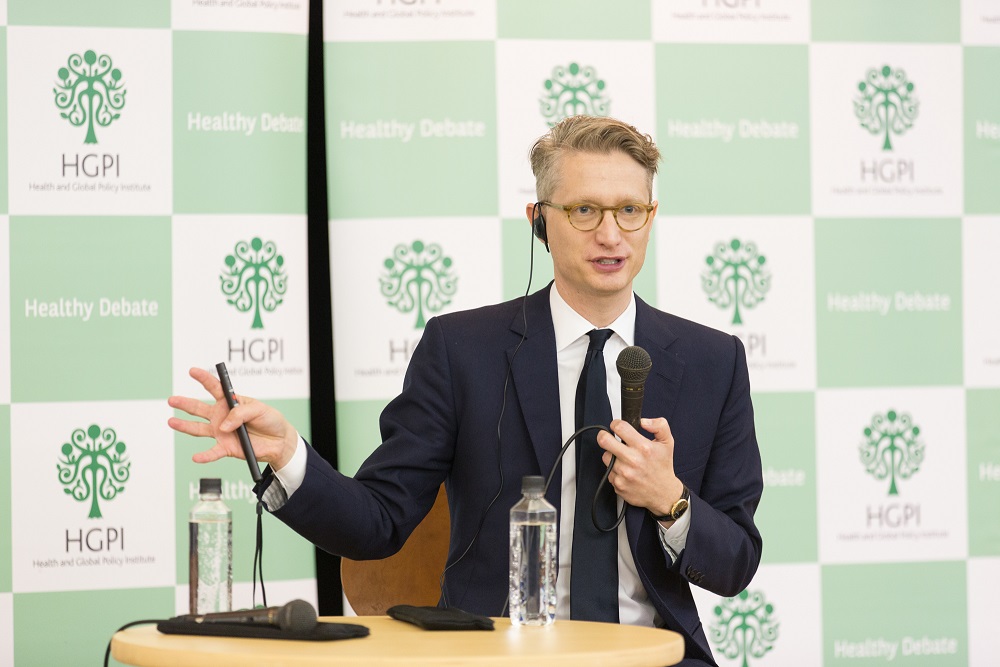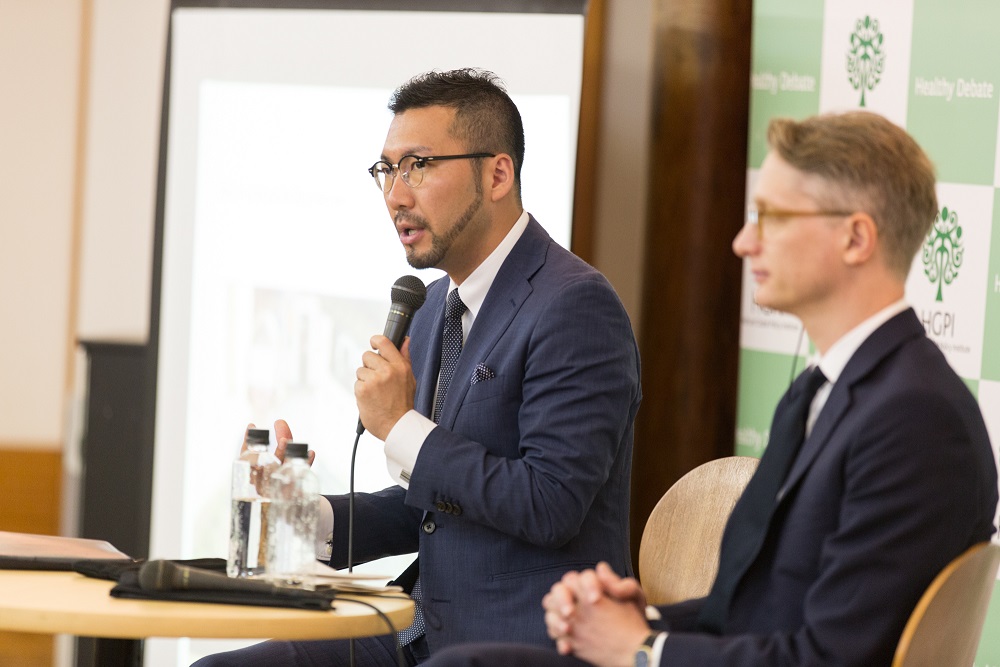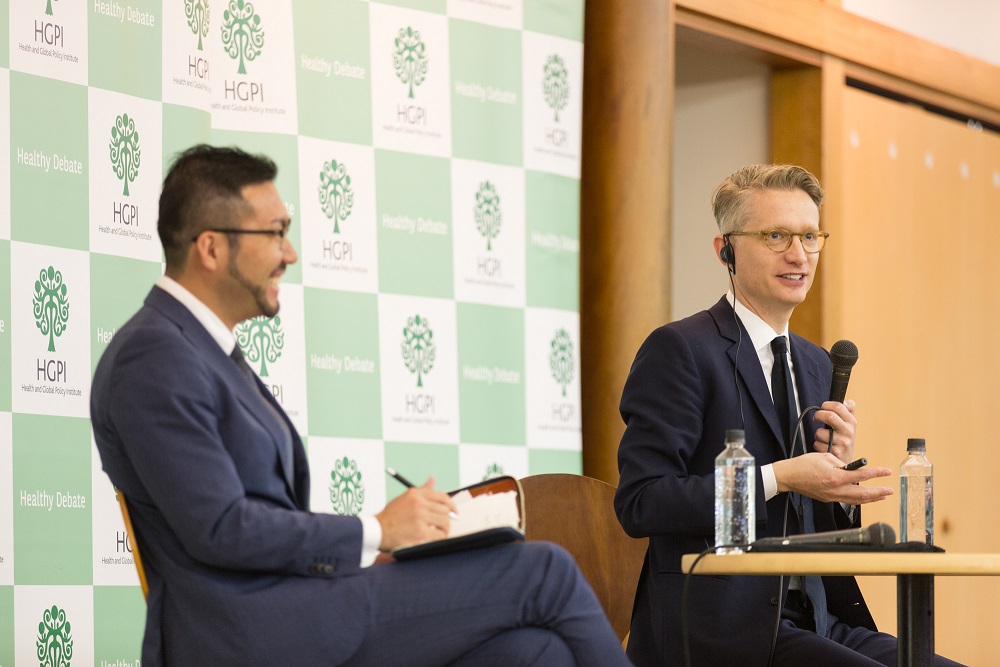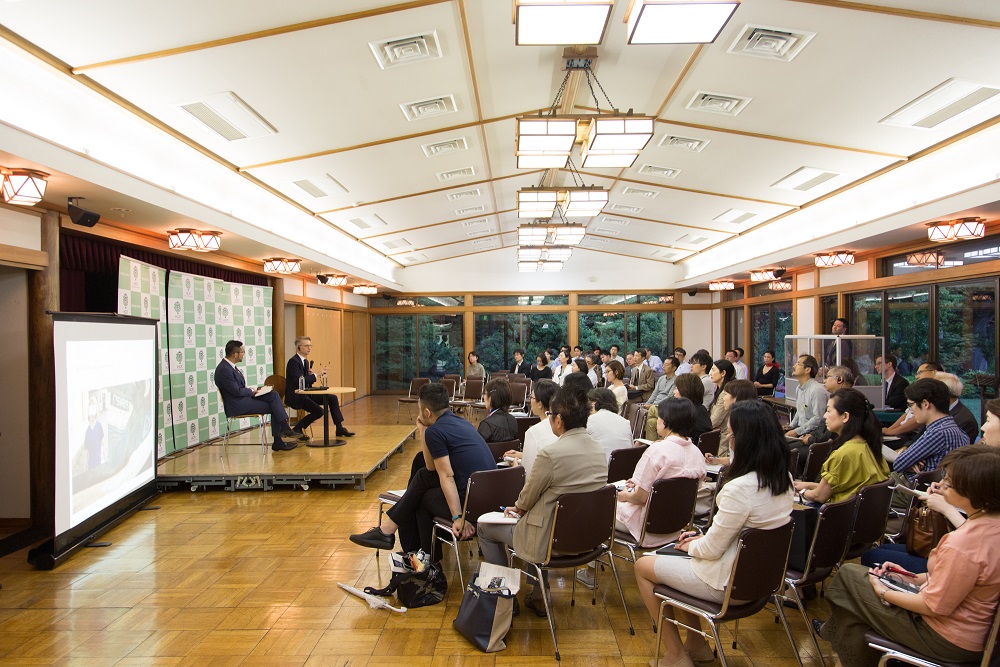[Event Report] Special discussion forum: Wisdom and philosophy for interpreting modern society by examining the intersection of culture, countries, individuals, and ideologies (May 28, 2019)
date : 7/22/2019
Tags: HGPI Seminar
![[Event Report] Special discussion forum: Wisdom and philosophy for interpreting modern society by examining the intersection of culture, countries, individuals, and ideologies (May 28, 2019)](https://hgpi.org/en/wp-content/uploads/sites/2/es-2-1.jpg)
HGPI hosted Christian Madsbjerg for a special discussion forum entitled “Wisdom and philosophy for interpreting modern society by examining the intersection of culture, countries, individuals, and ideologies.” Mr. Madsbjerg is an author as well as founder and partner of ReD Associates, a consulting firm that employs many social scientists that has received worldwide attention.
■Thin data and thick data
Here is a photo of a man and a car. Using big data, we can determine various facts such as the location of the car, the distance it has been driven, its speed, and number of times the car has stopped. In the future, it will probably become possible to measure the body temperature of the driver and, using tracking technology, even track his eye movements. However, it is impossible to understand the context of the photo using those kinds of thin data.
The man driving the car is headed to Lizard Head Pass to get back to nature. On the way, he removed a tree that was blocking the road. He feels good because he thinks that was helpful to the people using the road after him. This type of data is called “thick data.” Thick data allows us to delve into context and understand various things by carefully observing and listening.
In order to gather thick data, it is necessary to actually visit the subject and directly experience their daily life. For example, during the planning stages of luxury automobile development, there is a tendency for planners to emphasize the maximum amount of fun that can be had driving freely on the open road. However, when examining the daily lives of the people who actually buy luxury automobiles, we discover that they often do not drive themselves. They usually sit in the back seat. They get caught in traffic jams every day where they cannot travel at 100 km/h. Instead, they are stuck traveling at 20 km/h. Facts like these make it easier to know how to design the rear seat space and how to advertise the vehicle. It becomes possible to form a strategy based on reality.
■A humanities-based approach is necessary
Let me introduce an example in healthcare. Revolutionary immunotherapy has lengthened the lifespans of people with cancer. Those who were once told they only had a few years left to live are now able to live miraculously longer lives. However, by actually meeting such people, we learned that because they were living longer lives, they were experiencing greater economic hardships and stress. There are various methods for supporting people in times like that, but unless you actually visit them, you would not even know there was a problem. So, even in the field of pharmaceuticals, there are definitely situations like this that require a human touch.
Next is an example of an over-engineered medical device. There was a high-end dialysis machine equipped with 32 types of alarms. When we checked on how it was being used, however, we learned the alarms were going off constantly because the staff using the machines had not received much training. When alarms are going off constantly, people stop listening to them. To operate these $200,000 dialysis machines, they were using $2 kitchen timers. This is an example of a gap between a technology and the people using it. Strange situations arise when these gaps are not closed.
For example, in order to improve adherence to daily insulin injection schedules among people with diabetes, it is more effective to provide an explanation that fits their daily rhythms. Say “Take it after you shower in the morning” instead of trying to explain using complicated medical data. Another example is in the development of colostomy bags. They must be designed only after the body types and daily lives of the people who will actually be using them are fully understood. While it is important that there is mutual consideration between users of thin data and users of thick data, data analytics cannot provide the consideration a human being can. You need people to understand people.
About 15 years ago, Lego’s sales were in a slump. At the time, statistical data told them that children have short attention spans and that many of them have ADHD. This led them to believe it was best to focus on developing simple toys that could be played with immediately. Instead of just believing the statistical data, we interviewed children. This is because children cannot be understood unless you adjust your pace to meet theirs. You must sit down and actually play with them.
When we did that, one of the boys we played with told us his favorite thing in the entire world was his shoes. He showed us a pair of shoes that were completely worn out. They were the shoes that he wore when he rode his skateboard. Those shoes told us just how focused he was on that activity. By no means did he have a short attention span, and he did not prefer simple toys. We made similar discoveries with the children we interviewed in other countries. Children like complicated things, and adults should not tell them how to play. They respond better to suggestions. As a result, Lego developed an entirely new portfolio of products and are now one of the biggest toy makers in the world.
We possess the ability to understand one another. This is partially driven by sociology and anthropology and partially driven by philosophy. Even for companies or public institutions and similar entities, it is impossible to fully understand individual subjects without using a humanities-based process.
■The ability to understand one another
What are some problems with people? For example, people possess prejudices. These can be excused by saying, “They’re only human.” They could also be called “human error.” However, people possess the ability to resonate with art that was created hundreds of years ago. People can connect with one another even over gaps of hundreds of years. People have the amazing ability to understand one another.
In recent years, big data and AI technology have advanced to the point where some people are beginning to expect they may become better at accurate decision-making than human beings. Fortunately, humans still possess strengths that technology cannot match. A famous American physicist once said, “In science, when human behavior enters the equation, things go nonlinear. That’s why physics is easy and sociology is hard.”
When examining a person, data analytics assumes they are an individual, that they know what they like and what they want, and that they can accurately report their own behavior. In reality, none of these assumptions are fully accurate. While most of us do not realize it, we are affected by culture in every aspect. This means it is necessary we consider context when formulating policy.


■Special discussion
Mr. Noritake:
When using anthropological methods, you adopt the viewpoint of an ordinary person and make discoveries through observation. Such methods are currently spreading to the field of medicine. For example, the reason vaccination rates among adults in Japan is low might be due to cultural perceptions and customs concerning vaccines. Similarly, the over-prescription of antibiotics might be caused by a mistaken cultural interpretation that antibiotics are magical drugs. If these phenomena are in fact caused by perception and culture, policies and guidelines will be ineffective no matter how many are written or enacted. On the other hand, if we are able to understand issues by examining people from an anthropological point of view, it may become possible to alter the behavior of the people in question.
The concept of health is changing as society ages. The number of people with dementia or chronic illnesses is increasing, and we are approaching an era where they will be common. The concept of health may need to be redefined to meet the concept of normality. The world is overflowing with information about health. There is a contradiction people encounter when they want to become healthy and start collecting data: the more care they pay to the issue, the more they are under someone else’s control. What will happen to the concept of health in the future? Who does health belong to? Please share your thoughts.
Mr. Madsbjerg:
What events are underway in the field of healthcare? According to the CEO of U.S. telecommunications and semiconductor company Qualcomm, when 5G, the next generation of generation of cellular network technology arrives, communication speeds will increase a hundredfold. If that happens, it will become possible to transmit location and biological information like body temperature in real time. Until now, we focused on use cases of technology, but in the future, we will have to pay more attention to misuse cases instead. When it becomes possible for technology to extract our health data, problems caused by misuse cases will become several times more important.
We must also ask, what is health? The concepts of health and illness are concerned with one’s ability to stay mobile. The line that can be drawn between them shifts over time. In mental health, the same thing applies to sanity and insanity. The debate on where to draw the line will never end. When someone develops dementia, does that mean that they have become unhealthy? We should think very carefully where to draw the line between health and illness. If the debate is not continued, drugs will continue to be over-prescribed and interactions with the elderly will become disrespectful. This is a topic that should be debated in every country. Since new technology carries with it great potential, possibilities for ways it can be misused must also be considered. We must also be prepared to face unexpected results. Although this might be a cause for concern, I think we must continue to have discussions on this topic just as we have had until now.
Mr. Noritake:
In the 1970s, Ivan Illich criticized healthcare systems as a form of public control in his book “Medical Nemesis.” At the time, he claimed that illness is becoming more widespread because we have healthcare systems, calling the phenomenon “iatrogenic disease.” It is now the 21st century and I think that healthcare models of the future will gradually shift away from hospital care.
Mr. Madsbjerg:
Right now, the United States spends 18% of its GDP on healthcare. That is not sustainable. I am not a specialist in health economics, but if the system were to be remade, the effort should not start from a framework, but rather be approached from a humanistic perspective. It is a fact that we are far healthier than we believe. Thinking in terms of people might make it possible to massively decrease costs.
Mr. Noritake:
Descartes said, “I think, therefore I am.” For people with dementia, satisfying the “I think” portion of Descartes’s statement may be difficult. How will the definition of “normal” change for humanity as the number of people with dementia increases?
Mr. Madsbjerg:
Heidegger said people are thoughtful and they have the capacity for compassion. Data analytics and AI can be neither thoughtful nor compassionate. People who have developed dementia, however, can be thoughtful and considerate of others. They do not lose their human capacity for kindness. The fact that they have developed dementia only means that their ability for comprehension has changed. They are merely standing on a different stage of life as we enter the era of the hundred-year lifespan.
Mr. Noritake:
The Designing for Dementia Hub that we established together with Keio University’s Wellness Research Center, issue+design, and the Dementia Friendship Club aims to build a future in which it is easier to live with dementia. I think Designing for Dementia’s position is based on the very premise you just described.
Mr. Madsbjerg:
Especially when dealing with public policy and healthcare, it is of the utmost importance that people are observed and listened to, and that the stories and opinions of those most affected are absorbed.
Mr. Noritake:
The proportion of top leaders in US companies with training in the humanities is relatively high. I would like to hear about that in more detail.
Mr. Madsbjerg:
Looking at the incomes of people ten to fifteen years after graduating university, those with degrees in the humanities are three times as numerous among the top five percent of earners in the U.S. In my opinion, this result is not so surprising. At some point, companies and public institutions require leaders who possess the tools acquired in a liberal arts education and can understand cultures, people, teams, and languages. Those leaders may have originally been computer scientists, engineers, sales force representatives, or from other disciplines.
Mr. Noritake:
One of the most interesting points in the debate about healthcare systems is the relationship between the government and the individual. As was written by Benedict Anderson, the nation-state could be called an “imagined community” in which the government has granted its citizens a form of security called healthcare. On the other hand, recent developments in globalization mean that healthcare, drugs, pathogenic bacteria, and people receiving treatment all cross the borders between countries. Please share your opinion about the relationship between healthcare systems and the state.
Mr. Madsbjerg:
For healthcare systems like that in Japan which utilize public funds and health premiums, pain is low and efficiency is high. Compared to the healthcare systems in France and the U.S., there are great merits to having healthcare systems based on public funding. By actually visiting those places, you can directly feel the merits. The next steps for the nation-state in the future of mankind is an extremely important theme. At the same time, the unification of individuals – solidarity – is extremely effective in society, so I would like to point out that the same can be said for healthcare systems.
A lively exchange of opinions was held during the question and answer session following the special discussion.


(Photographed by: Kazunori Izawa)
■Profile
■Mr. Christian Madsbjerg
Mr. Christian Madsbjerg studied philosophy and political science in Copenhagen and London and has a master’s from the University of London. He has worked as a management consultant for twenty years, and he writes, speaks, and teaches on the practical application of the human sciences. His work has been featured in publications such as The Wall Street Journal, Financial Times, The Washington Post, Der Spiegel, and Bloomberg Businessweek. His latest book, “Sensemaking: The Power of the Humanities in the Age of the Algorithm,” was released in the spring of 2017 by Hachette Book Group. His book “The Moment of Clarity,” co-written with Mikkel Rasmussen and published in the fall of 2014, has been published in more than fifteen languages.
■Mr. Ryoji Noritake
Mr. Ryoji Noritake is the CEO, Board Member of HGPI. He is a graduate of Keio University’s Faculty of Policy Management and he holds an MSc in Medical Anthropology from the University of Amsterdam, the Netherlands. During his time at an international NGO, he worked to establish healthcare facilities for disaster prevention in developing countries and areas struck by disaster, mainly in the Asia-Pacific region. He has worked with organizations such as governments of developing nations, private enterprises, other international NGOs, and armed forces to provide healthcare assessment from the perspective of medical anthropology. Through his fieldwork in various countries, he has unified multi-sectoral stakeholders including those from the fields of engineering and design in projects for overcoming challenges facing healthcare. He is currently a Visiting Scholar at the National Graduate Institute for Policy Studies and a member of Tokyo Metropolitan Government’s Policy Discussion Roundtable for a Super Ageing Society. He is also a member of Salzburg Global Seminar’s Advisory Council and is an Advisory Board Member of Elsevier Atlas.
Top Research & Recommendations Posts
- [Policy Recommendations] Achieving a Sustainable Society of Health and Longevity Through the Integration of Environment and Healthcare-Incorporating a Planetary Health Perspective into the 3rd Phase of The Healthcare Policy-(December 20, 2024)
- [Research Report] Building a Mental Health Program for Children and Measuring its Effectiveness (June 16, 2022)
- [Policy Recommendations] Integrating Climate and Health for a Sustainable Society: Incorporating a Planetary Health Perspective into Nationally Determined Contributions (NDCs)(December 9, 2024)
- [Policy Recommendations] Developing a National Health and Climate Strategy for Japan (June 26, 2024)
- [Policy Recommendations] Policy Recommendations on Strengthening CKD Strategies for Workers: The Importance of Providing Early Detection, Intervention, and Support Through Screenings and Medical Visits (October 28, 2024)
- [Research Report] The 2023 Public Opinion Survey on Satisfaction in Healthcare in Japan and Healthcare Applications of Generative AI (January 11, 2024)
- [Event Report] Planetary Health Expert Meeting Aiming for Sustainable Healthcare: Learning from the Impact of Environmental Pollution and Medical Waste During the Pandemic (February 16, 2024)
- [Policy Recommendations] Obesity Control Promotion Project 2023 “The Next Steps for Engaging and Cooperating with Patients, Citizens, and Communities for Implements of Obesity Control Measurements” (April 8, 2024)
- [Announcement] A Turning Point Towards Building Green Healthcare Systems (June 5, 2024)
- [Research Report] Survey of Japanese Physicians Regarding Climate Change and Health (December 3, 2023)
Featured Posts
-
2024-11-25
[Registration Open] (Webinar) The 130th HGPI Seminar “Marking a Decade of the Act on Medical Care for Patients With Intractable Diseases: Connecting Intractable Diseases and Society From the Perspective of a Media Professional and Family Member” (January 28, 2025)
![[Registration Open] (Webinar) The 130th HGPI Seminar “Marking a Decade of the Act on Medical Care for Patients With Intractable Diseases: Connecting Intractable Diseases and Society From the Perspective of a Media Professional and Family Member” (January 28, 2025)](https://hgpi.org/en/wp-content/uploads/sites/2/hs130-top_JPNENG-1.png)
-
2024-12-18
[Policy Recommendations] Policy Recommendations on Strengthening CKD Strategies for Workers: The Importance of Providing Early Detection, Intervention, and Support Through Screenings and Medical Visits (October 28, 2024)
![[Policy Recommendations] Policy Recommendations on Strengthening CKD Strategies for Workers: The Importance of Providing Early Detection, Intervention, and Support Through Screenings and Medical Visits (October 28, 2024)](https://hgpi.org/en/wp-content/uploads/sites/2/HGPI_20241023_FY2024CKD_eyecatch.jpg)
-
2024-12-20
[Policy Recommendations] Achieving a Sustainable Society of Health and Longevity Through the Integration of Environment and Healthcare-Incorporating a Planetary Health Perspective into the 3rd Phase of The Healthcare Policy-(December 20, 2024)
![[Policy Recommendations] Achieving a Sustainable Society of Health and Longevity Through the Integration of Environment and Healthcare-Incorporating a Planetary Health Perspective into the 3rd Phase of The Healthcare Policy-(December 20, 2024)](https://hgpi.org/en/wp-content/uploads/sites/2/e8a714648913193b03d5b6ede38c161e.png)
-
2024-12-25
[Registration Open] (Hybrid Format) Expert Meeting “Innovations Required to Achieve Precision Psychiatry” (January 22, 2025)
![[Registration Open] (Hybrid Format) Expert Meeting “Innovations Required to Achieve Precision Psychiatry” (January 22, 2025)](https://hgpi.org/en/wp-content/uploads/sites/2/mh-20250122-topr-1.png)
-
2024-12-27
[Activity Report] Second UN General Assembly High-Level Meeting on AMR (September 26, 2024)
![[Activity Report] Second UN General Assembly High-Level Meeting on AMR (September 26, 2024)](https://hgpi.org/en/wp-content/uploads/sites/2/4ED86AF7-49DE-465D-B59D-843B4F3C6102_1_201_a-scaled-1.jpeg)




